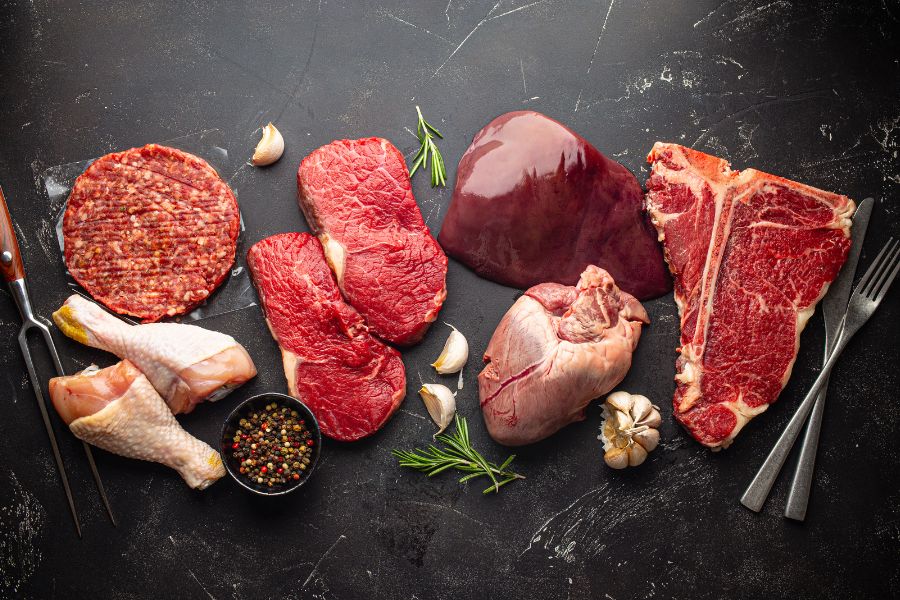As chronic disease rates rise and processed foods dominate grocery aisles, a small but growing tribe of thought leaders, doctors, and athletes are turning back to the most primal way of eating: an animal-based diet. Among them are Dr. Robert Lustig, pediatric endocrinologist and author of Fat Chance; Dr. Paul Saladino, author of The Carnivore Code; and Mark Sisson, endurance athlete and author of The Primal Blueprint. Each brings a unique lens to the conversation, but all converge on one simple truth: returning to real, nutrient-dense animal foods may be the key to health, performance, and longevity.
The Metabolic Crisis: Dr. Robert Lustig's Warning
Dr. Robert Lustig has been sounding the alarm on sugar and processed food for over a decade. In Fat Chance, he outlines how fructose, refined carbohydrates, and seed oils have hijacked our biochemistry, contributing to a host of metabolic diseases including obesity, diabetes, and fatty liver.
"It’s not about calories. It’s about the quality of your food. It’s about hormones and how your body responds to what you eat," Lustig explains. He argues that metabolic syndrome now affects as many as 88% of Americans, and the solution isn’t another fad diet—it’s a return to real food.
Animal-based diets, high in bioavailable nutrients and free from refined carbohydrates and industrial seed oils, offer a metabolic reset. High-quality proteins from grass-fed beef, wild-caught fish, and pasture-raised eggs provide amino acids crucial for hormonal balance, lean muscle mass, and immune resilience. Healthy animal fats support mitochondrial function and satiate better than any processed snack ever could.
The Carnivore Perspective: Dr. Paul Saladino
Once a traditional functional medicine doctor, Dr. Paul Saladino shifted to a carnivore diet after years of battling eczema and gut issues. His book The Carnivore Code champions a nose-to-tail approach that includes organ meats, high-quality animal fat, and collagen-rich cuts.
Saladino argues that many chronic conditions—from autoimmune diseases to mental health disorders—stem from inflammation triggered by plant toxins like oxalates, lectins, and phytic acid. “Red meat is not the enemy,” he writes. “It is the solution.”
He also emphasizes the importance of animal organs as nutritional powerhouses: liver for vitamin A and B12, heart for CoQ10, and bone marrow for stem-cell supportive fats. Rather than shunning fat, he celebrates it, noting that animal fat contains stearic acid, a type of saturated fat shown to support mitochondrial health and reduce visceral fat.
For athletes, Saladino recommends raw honey as a carb source when needed, and tallow or ghee for fuel. Hunghee, a portable blend of grass-fed ghee, raw honey, and sea salt, fits squarely within this philosophy.
Primal Energy: Mark Sisson’s Evolutionary Blueprint
Mark Sisson, a former elite triathlete, was ahead of the curve with The Primal Blueprint. Long before "ancestral health" was trending, he was making the case that humans are best adapted to eat as our hunter-gatherer ancestors did. That means animal protein, healthy fats, and very few grains or sugars.
“Fat is not the enemy,” says Sisson. “It’s the preferred fuel of the human metabolism.” He emphasizes metabolic flexibility—the ability to burn both fat and carbs efficiently—and argues that animal-based diets are the fastest route there.
Sisson highlights the superior nutrient density of animal foods, pointing out that you’d have to eat pounds of spinach to match the iron in a small serving of beef liver. He also credits his long-term joint health and mental clarity to a diet rich in wild-caught salmon, grass-fed beef, and pasture-raised eggs.

Nutrient Density: The Missing Link
What unites these three voices is a focus on nutrient density. Unlike modern plant-based snacks or ultra-processed vegan protein bars, animal-based foods are loaded with vitamins and minerals in their most absorbable forms:
- Vitamin B12: Only found in animal products; critical for red blood cell formation and brain function.
- Heme Iron: Far more absorbable than plant-based iron.
- Creatine: Supports muscle mass and cognitive performance; found in meat and absent in plants.
- Taurine: An amino acid that supports cardiac health and is abundant in red meat.
- Vitamin K2: Found in egg yolks and liver; essential for bone and cardiovascular health.
Add to that high-quality fats like stearic acid, DHA, and conjugated linoleic acid (CLA), and you have a nutritional profile unmatched by anything in the plant kingdom.
Saturated Fat: The Misunderstood Hero
Despite decades of vilification, saturated fat is making a scientific comeback. The latest research shows that when sourced from healthy animals, saturated fats can offer profound benefits for hormone regulation, inflammation control, digestion, brain function, and immune resilience.
Hormones—particularly testosterone and estrogen—are synthesized from cholesterol, which is abundant in saturated fats. This makes animal fats crucial for hormonal health in both men and women.
Inflammation, long associated with chronic diseases, is worsened by sugar and seed oils—not saturated fat. In fact, certain saturated fats like stearic acid and palmitic acid have been shown to have anti-inflammatory effects, especially when consumed in the context of a low-toxin, animal-based diet.
For digestion, saturated fats stimulate bile production and help absorb fat-soluble vitamins like A, D, E, and K. They also support the gut lining and microbiome integrity.
From a cognitive standpoint, the brain is nearly 60% fat by weight, and saturated fats like those found in butter, ghee, and animal marrow play a vital role in maintaining neuronal health and synaptic function.
Finally, saturated fats fortify immune defenses. Lauric acid, found in butter and beef fat, has antimicrobial properties that help ward off pathogens.
Put simply, when your fat comes from regenerative, well-raised animals, it's not a liability—it's a lifeline.

Fueling the Adventurer
Athletes and adventurers demand food that fuels without compromise. Carbs have a role, especially in intense training, but fat is the long-burning log to the carb’s kindling. Hunghee provides a convenient, portable solution: a real-food blend of grass-fed ghee (for clean, slow-burning fat), raw honey (for a quick energy bump), and ancient sea salt (to replace lost electrolytes).
When you're eating ancestrally, snacks don't need to be complicated—just nutrient-dense and fat-fueled. Here are some of the best animal-based snacks to keep energy steady between meals or out on the trail:
- Hunghee Energy Pack: A blend of grass-fed ghee, raw honey, and sea salt—ideal for clean, sustained fuel.
- Hard-Boiled Pasture-Raised Eggs: Portable, filling, and rich in protein and choline.
- Beef Liver Crisps or Jerky: Packed with B12, iron, and minerals—perfect for nutrient density on the go.
- Pork Rinds Cooked in Tallow: A crunchy, zero-carb option high in collagen and gelatin.
- Chunks of Aged Cheese: If tolerated, raw or aged cheeses provide fat, calcium, and protein.
- Smoked Salmon Strips or Sardines: Rich in omega-3s and great for cognitive and cardiovascular support.
- Homemade Tallow Bites: Rendered fat whipped with collagen, sea salt, and a touch of honey for flavor (if desired).
No fillers, no grains, and no blood sugar crash—just ancestral fuel to keep you moving.
A Day on the Animal-Based Plate
Meal Plan 1:
- Breakfast: 3 pasture-raised eggs, avocado slices, and leftover grass-fed steak
- Lunch: Liverwurst with fermented sauerkraut, goat cheese, and a side of blueberries
- Snack: Hunghee Trail Boost Bite or spoonful straight from the pouch
- Dinner: Wild-caught salmon with bone broth reduction and roasted marrow bones
- Dessert (if desired): A few raw honeycomb pieces and coconut butter
Meal Plan 2:
- Breakfast: Scrambled eggs cooked in tallow, served with smoked salmon and a few olives
- Lunch: Grilled lamb chops with bone broth and a side of beet kraut
- Snack: Hard-boiled pasture-raised eggs and a pinch of sea salt
- Dinner: Ribeye steak with a side of sautéed beef liver and ghee-glazed carrots
- Dessert (optional): Full-fat Greek yogurt with a drizzle of raw honey
Meal Plan 3:
- Breakfast: Bulletproof-style coffee with ghee and collagen, plus two soft-boiled eggs
- Lunch: Duck confit salad with arugula, poached egg, and balsamic reduction
- Snack: Hunghee pack or beef liver crisps
- Dinner: Slow-cooked oxtail stew with marrow bones and braised onions
- Dessert (optional): Coconut cream whipped with vanilla bean and topped with crushed macadamias

Addressing the Myths
Myth #1: Red Meat Causes Heart Disease
Dr. Saladino and Sisson both challenge this outdated claim. New studies show that unprocessed red meat is not associated with cardiovascular risk. What is risky? Processed sugars, refined grains, and industrial seed oils.
“We’ve been eating animal foods with saturated fat in them for the entirety of our evolution of humans. This has led us to become the extremely intelligent, large-brained, strong, and adaptable people we are today. Science has also recently begun to support the things we already knew to be true, and studies have shown that high-fat ketogenic diets containing plenty of saturated fat reverse diabetes and insulin resistance. They also lead to weight loss and improvements in inflammatory markers, as well as a reduction in hypertension, dementia, polycystic ovarian syndrome, and a host of other conditions. Animal studies show that saturated fat does not induce leaky gut, but polyunsaturated vegetable oils, like corn oil, do open tight junctions and damage the gut lining.” Dr. Paul Saladino, Carnivore Code
Myth #2: Animal Fats Are Unhealthy
Sisson points to cultures like the Inuit and Maasai, who thrive on high-animal-fat diets. Saturated fat from healthy animals supports brain function, hormone production, and cellular integrity.
Myth #3: You Need Fiber from Plants
Dr. Saladino argues that while fiber isn’t harmful for most, it's not essential. Many on carnivore diets experience better digestion without it.
The Sustainability Conversation
All three experts agree: not all meat is created equal. Factory-farmed meat, pumped with antibiotics and fed grains, is not the goal. Regenerative agriculture—with grass-fed, pasture-raised animals rotating through the land—restores soil health, sequesters carbon, and mimics nature’s cycles.
Supporting companies that embrace these practices (like those sourcing Hunghee's ingredients) isn’t just good for your health—it’s good for the planet.
Final Word: Eat Like a Human
Whether you’re chasing podium finishes, mountain summits, or just better health, an animal-based diet provides the fuel you were built for. Dr. Lustig warns of the modern food trap. Dr. Saladino offers the healing power of organ meats. Mark Sisson lights the path to lifelong vitality. And Hunghee brings that ancestral wisdom to the trail, the gym, and your daily grind.
In the words of Sisson: “Live awesome.” That starts with what you put in your mouth.
Hunghee Ancestral Energy is grounded in primal nutrition—packed with the most bioavailable animal-based nutrients and fueled by fat for performance, clarity, and adventure. Whether you're chasing peaks, hitting the gym, or just managing the chaos of everyday life, Hunghee's 1oz on-the-go packs deliver clean-burning, fat-fueled energy rooted in evolutionary wisdom. Made with organic grass-fed ghee, local raw honey, and ancient sea salt, Hunghee is fuel the way nature intended.
Disclaimer: This content is for informational purposes only and is not intended as medical advice. Please consult your healthcare provider for advice about a specific medical condition or before starting any new fitness or nutritional program.

